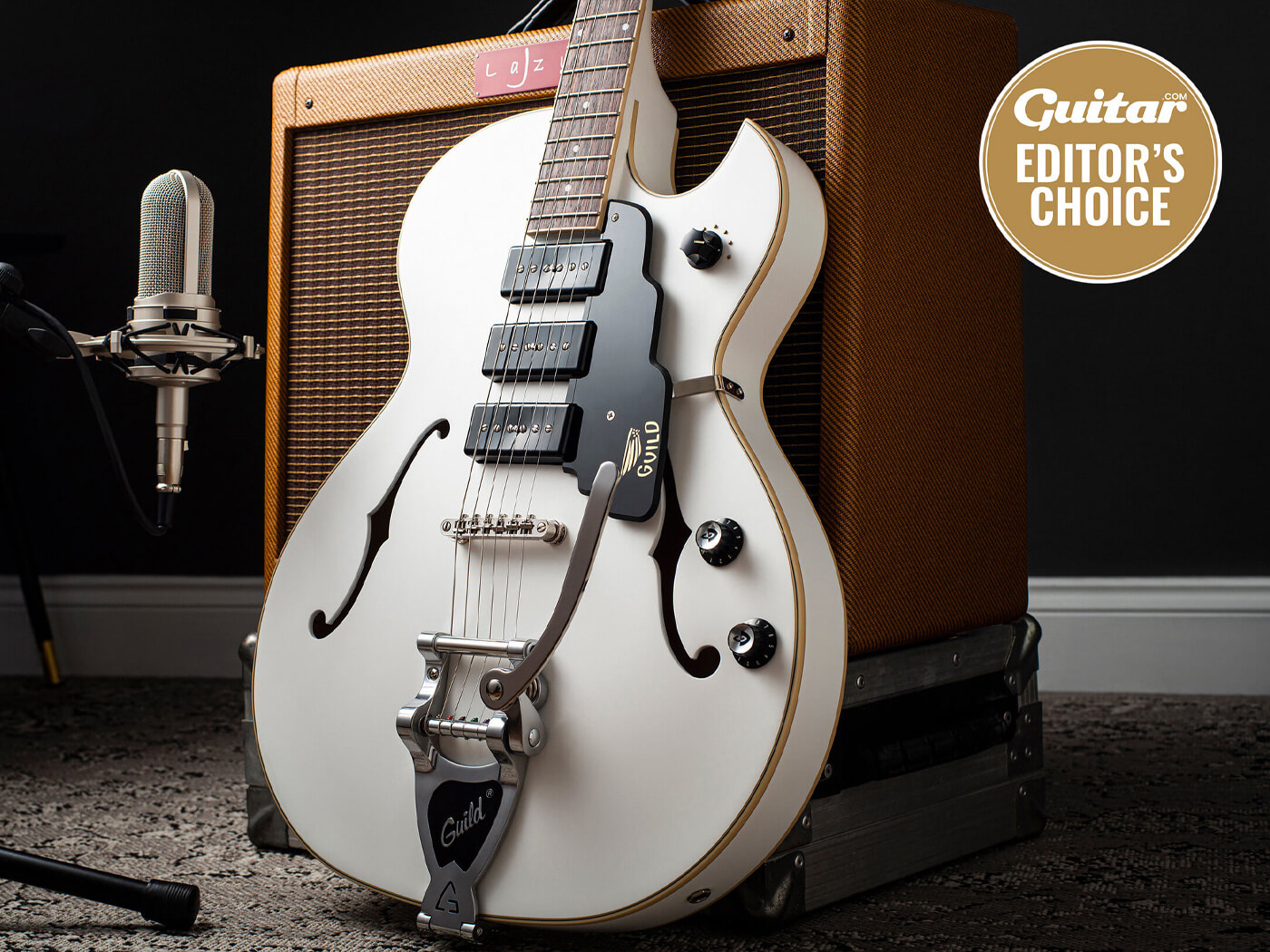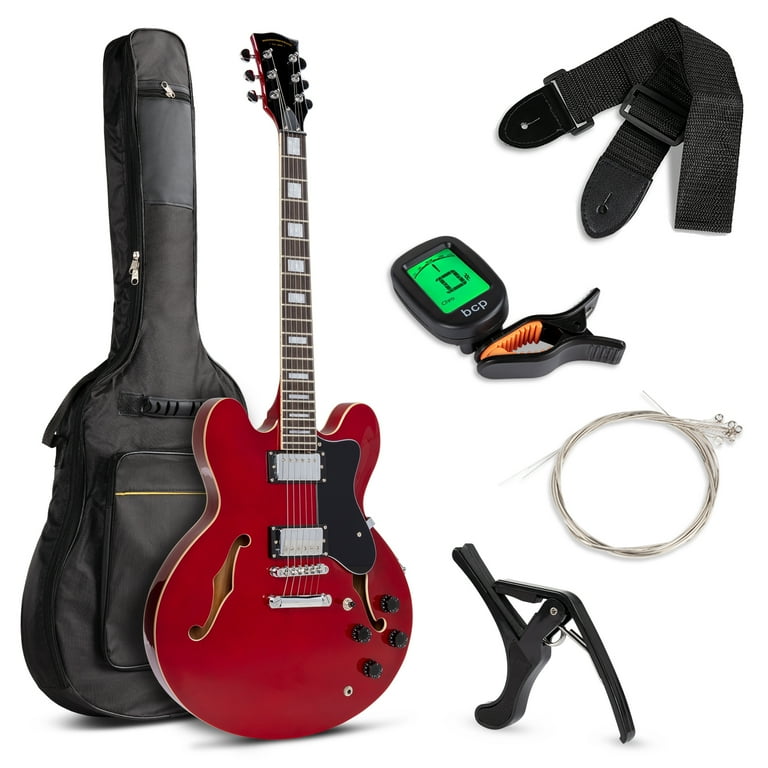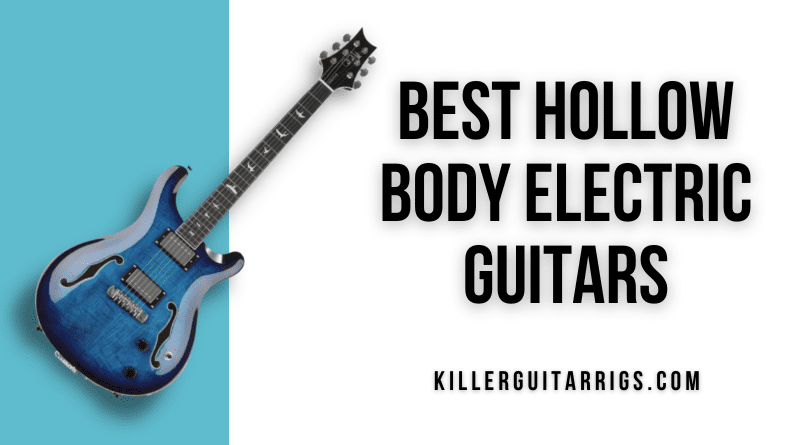A hollow-body electric guitar may not cater to everyone’s needs, despite its unique sound characteristics and vintage appeal. The choice ultimately depends on personal preference and musical style.
Hollow-body electric guitars stand as icons in the music industry, revered for their rich, warm tones that resonate with jazz, blues, and rockabilly genres. Sporting a distinct design that dates back to the early 20th century, these instruments entice players with their blend of acoustic resonance and electric amplification capabilities.
Ideal for those seeking a smooth sound with a touch of natural acoustics, these guitars offer a unique playing experience. Musicians admire their lightweight construction and the aesthetic vintage vibe they bring to performances, making them a beloved choice among many guitarists seeking to infuse depth and character into their music. However, for artists playing in high-gain settings who require feedback control and higher output, a solid-body electric might be a more practical option.

Credit: guitar.com
Introduction To Hollow-body Electric Guitars
Embark on a resonant journey through the world of hollow-body electric guitars, where the harmony of design meets the melody of history. These musical marvels are celebrated for their warm, rich tones and have been the backbone of many iconic performances. Understanding the essence, evolution, and the unique stand of hollow-body guitars in comparison to their solid-body and semi-hollow counterparts is not just enlightening for musicians and enthusiasts, but crucial for anyone exploring the soul-stirring domain of electric guitars.
Defining The Hollow-body Electric Guitar
A hollow-body electric guitar, often symbolizing aesthetic beauty and sonic depth, is defined by its fully hollow construction. Unlike solid-body guitars that rely on electronic amplification to produce sound, hollow bodies have a resonant tonewood body that offers a natural acoustic amplification. This results in a richer, more rounded sound that is highly sought after in jazz, blues, and genres where melody takes precedence.
Historical Development And Iconic Models
The genesis of hollow-body electric guitars dates back to the early 20th century, with models like the Gibson ES-150 leading the charge. This instrument alone ignited a revolution that paved the way for a galaxy of iconic guitars. Legendary players such as B.B. King with his beloved “Lucille”, and George Benson, have elevated these models to remarkable status. A deep dive into history uncovers a tapestry of innovation and sound evolution, as manufacturers like Gibson, Gretsch, and Epiphone continued to refine their creations, leading to today’s modern masterpieces.
Comparison To Solid-body And Semi-hollow Electric Guitars
In a side-by-side comparison, each guitar body type sings its own tune. Solid-body guitars, known for their punch and sustain, are the go-to for rock, metal, and pop genres, while semi-hollow bodies provide a middle ground with some resonance but less feedback susceptibility. Hollow-body guitars stand distinct with their acoustic-like qualities and a softer, warmer timbre, presenting a different palette of sounds. Each type offers its own flavor and response to the touch of the artist, making the selection a deeply personal choice for players everywhere.

Credit: www.walmart.com
Understanding The Unique Characteristics Of Hollow-body Electric Guitars
For many guitar enthusiasts and musicians, the hollow-body electric guitar stands as an enduring icon of style and sound. These instruments, with their distinctive construction and appearance, bring a unique fusion of design elegance and sonic versatility. Exploring the characteristics of hollow-body guitars reveals why they remain beloved and how they continue to shape musical expression.
Design And Acoustic Properties
Hollow-body electric guitars boast a fully hollow interior, which distinguishes them from their solid-body counterparts. This design gives them a lightweight feel and an acoustic resonance that’s both warm and rich.
- Large body: Typically features a larger body size for enhanced acoustic sound projection.
- Sound holes: Equipped with f-holes or round holes that contribute to air movement and resonance within the body.
- Aesthetic appeal: Often presents an arched top with elegant curves and a vintage vibe.
- Build materials: Usually crafted with woods like maple or spruce, which impact the guitar’s tonal qualities.
Thanks to these acoustic properties, hollow-body guitars produce a natural reverberation that is hard to replicate with purely electronic means.
Tonality And Sound Signature
The tonal characteristics of hollow-body electric guitars set them apart in the musical landscape. With a sonic palette that ranges from warm and mellow to bright and twangy, these guitars are incredibly versatile.
- Warmth: The hollow design offers a naturally warm and round sound.
- Resonance: Enhanced sustain and a reverberating tone stem from the body’s acoustic nature.
- Versatility: Pickup configurations allow for a broad range of sounds suitable for various styles.
- Feedback: Prone to feedback at high volumes, which can be both a pro and a con depending on usage.
The sound signature of hollow-body guitars is not merely a byproduct of their design but a defining attribute that impacts their playability and application across genres.
Common Uses In Different Music Genres
Hollow-body electric guitars have found their niche in diverse musical settings. Their adaptable nature allows for a sweeping range of genres: from jazz to rockabilly, from blues to certain types of rock.
| Genre | Common Usage |
|---|---|
| Jazz | Perfect for intricate chord melodies and soulful solos. |
| Blues | Offers rich, emotive tones ideal for expressive playing. |
| Rockabilly | Excels in creating the signature twang and upbeat riffs. |
| Rock | Used in classic and indie rock for its warm, resonant tones. |
Each genre draws out different facets of the guitar’s sound, showcasing its multifaceted voice.
Pros And Cons For Live Performances And Recordings
When considering a hollow-body electric guitar for live performances and recordings, there are notable advantages and disadvantages to bear in mind.
Pros:- Visually striking presence on stage, enhancing the overall performance aesthetic.
- Rich, full-bodied acoustic tones that can fill a room even without amplification.
- Nuanced sound dynamics that offer expressivity and depth in recordings.
- Feedback issues can arise at higher volumes or with specific stage setups.
- The larger body size may not be comfortable for all players, especially during long gigs.
- May require more precise mic placement and mixing techniques to capture their best sound in the studio.
Assessing these considerations is crucial for musicians who aim to maximize the potential of their hollow-body electric guitars in different performance contexts.
Choosing The Right Guitar For Your Needs
Guitars aren’t just instruments—they are the key to unlocking your musical expression. With so many options, finding the perfect match for your preferences can be a play of precision and passion. A hollow-body electric guitar might be on your radar, and there’s a good chance it could be the companion your music seeks. Let’s explore what sets the hollow-body apart and how it might satisfy your musical cravings.
Assessing Playability And Comfort
Finding a guitar that feels like an extension of your body is essential for seamless playing. A hollow-body electric guitar, known for its light weight and balanced neck, can offer unparalleled comfort, making those long practice sessions less of a strain on your shoulders and hands. It’s crucial to consider neck profile, scale length, and body shape for your physical comfort. Pay special attention to:
- Neck width and thickness: To accommodate your hand size and playing style.
- String spacing: For ease of fretting and picking.
- Body contours: Ensuring the guitar rests comfortably against you.
Evaluating Sound Quality For Your Style
The right guitar should resonate with your musical style. Hollow-body guitars are famed for their warm, rich tones that compliment genres such as jazz, blues, and rockabilly. Consider the following to gauge a guitar’s sound quality:
- The type of wood and construction affecting tone and sustain.
- Pickup types, like single-coil or humbuckers, that influence sound texture.
- The guitar’s capacity to hold tune and its overall resonance.
Considering The Price Point And Value
Your budget will inevitably shape your choice. Remember, a higher price doesn’t always guarantee a better instrument. It’s about getting the best value for your money. Seek out guitars that offer:
- Quality craftsmanship: Without compromising on build quality.
- Component integrity: Looking at tuners, bridges, and electronics that last.
- Resale value: If you consider upgrading in the future.
Popular Brands And Models To Consider
Many reputable brands have solidified their status with exceptional hollow-body models. Familiarize yourself with names like Gibson, Gretsch, Epiphone, and Ibanez. Some iconic models that have captured the hearts of musicians worldwide include:
| Brand | Model | Notable Features |
|---|---|---|
| Gibson | ES-335 | Versatile sound, high-quality build |
| Gretsch | Country Gentleman | Chimey tones, standout looks |
| Epiphone | Casino | Classic design, Beatles association |
Making The Decision: Is A Hollow-body Electric Guitar The Best For You?
Concluding your search starts with a clear understanding of your needs. A hollow-body electric guitar brings a distinct character and ease of play to the table. Whether it’s the best for you hinges on your genre, playing style, and personal preferences. Guitars are deeply personal instruments—test out various models, feel their pulse beneath your fingers, and let the music guide your choice.

Credit: killerguitarrigs.com
Is a Hollow-Body Electric Guitar the Best Option for Those Seeking a Lightweight Instrument?
For musicians seeking comfort without sacrificing sound quality, a hollow-body electric guitar stands out. Its unique construction offers a balanced tone, and many models weigh significantly less than solid-body counterparts. To find the perfect fit, explore various styles and discover the lightest electric guitar options available that suit your playing needs.
Frequently Asked Questions Of Is A Hollow-body Electric Guitar The Best
What Is The Advantage Of A Hollow Body Electric Guitar?
A hollow body electric guitar offers a rich, acoustic-like tone with enhanced resonance and less feedback at high volumes. It’s lightweight and ideal for jazz, blues, and rock.
Is Solid Body Or Hollow Body Guitar Better?
The choice between a solid body or hollow body guitar depends on the music style. Solid bodies suit rock and metal, while hollow bodies are better for jazz and blues.
What Are The Disadvantages Of A Hollow Body Guitar?
Hollow body guitars often experience feedback issues at high volumes. They can be less durable and more prone to damage. The shape and size also make them bulkier and harder to play for some individuals. Their sound suits specific genres, which may limit versatility.
Do Hollow Body Electric Guitars Sound Different?
Yes, hollow body electric guitars have a distinct sound, often richer and more resonant due to their acoustic-like body construction.
Conclusion
Deciding on the ultimate electric guitar is a personal journey. Hollow-body models offer a distinct sound, beloved in genres like jazz and blues. They combine craftsmanship with aesthetic appeal, making them a top choice for many. Ultimately, the best guitar meets your specific sound and style preferences.
Embrace the quest for your perfect musical partner.
